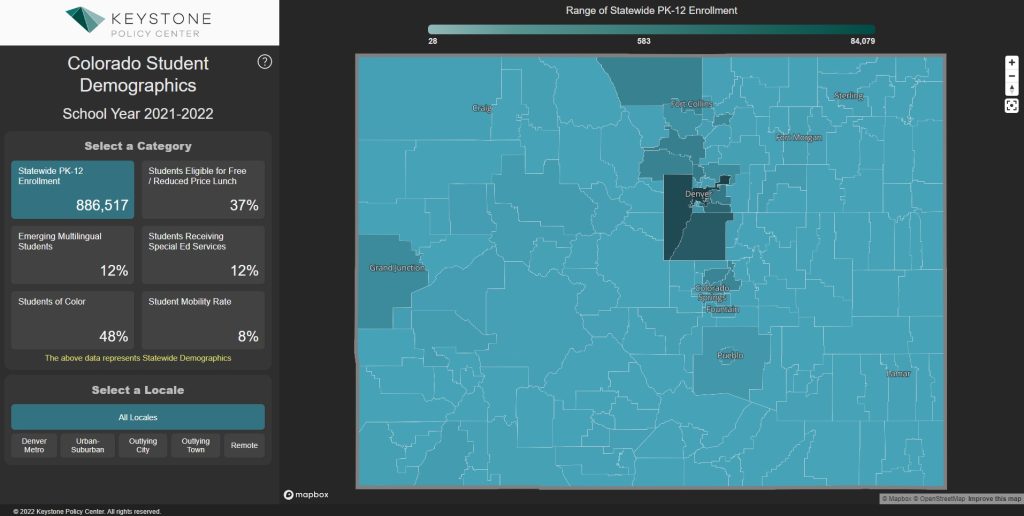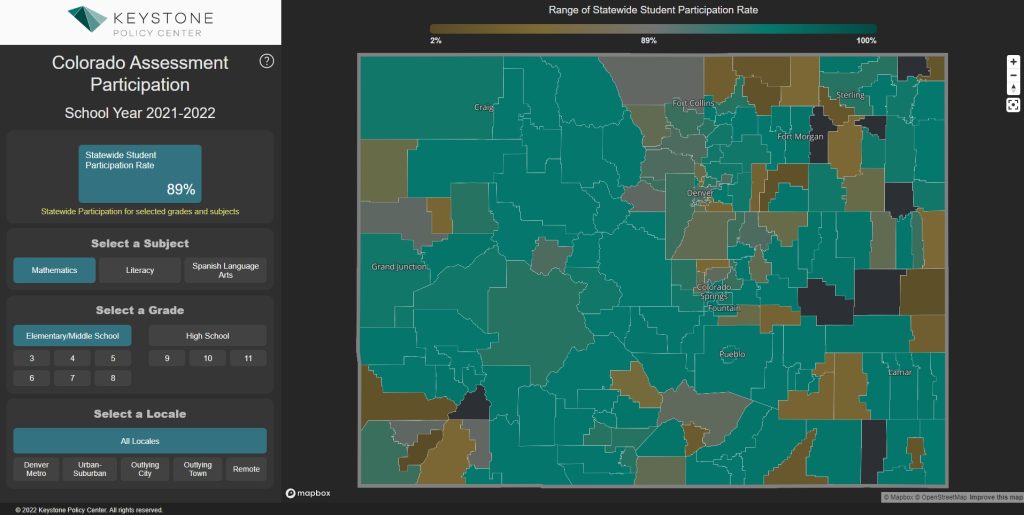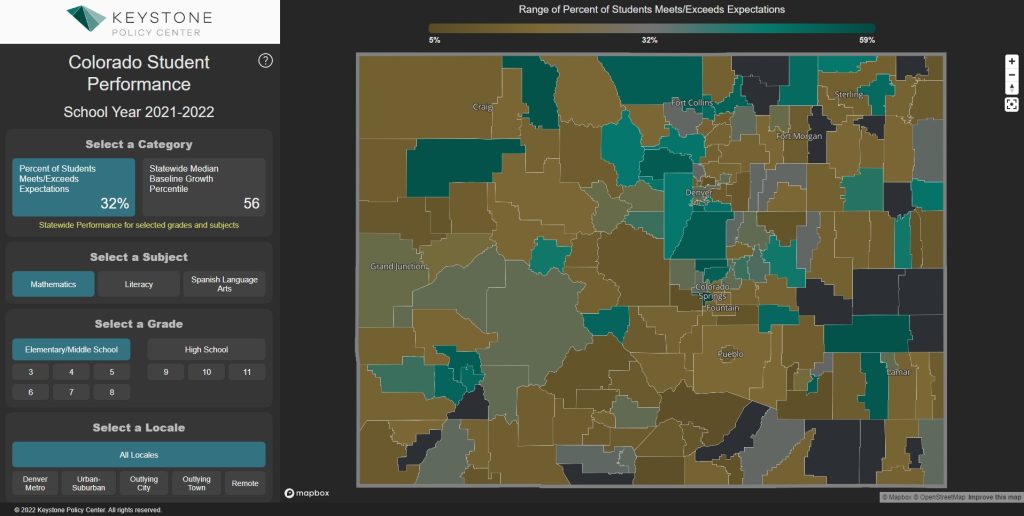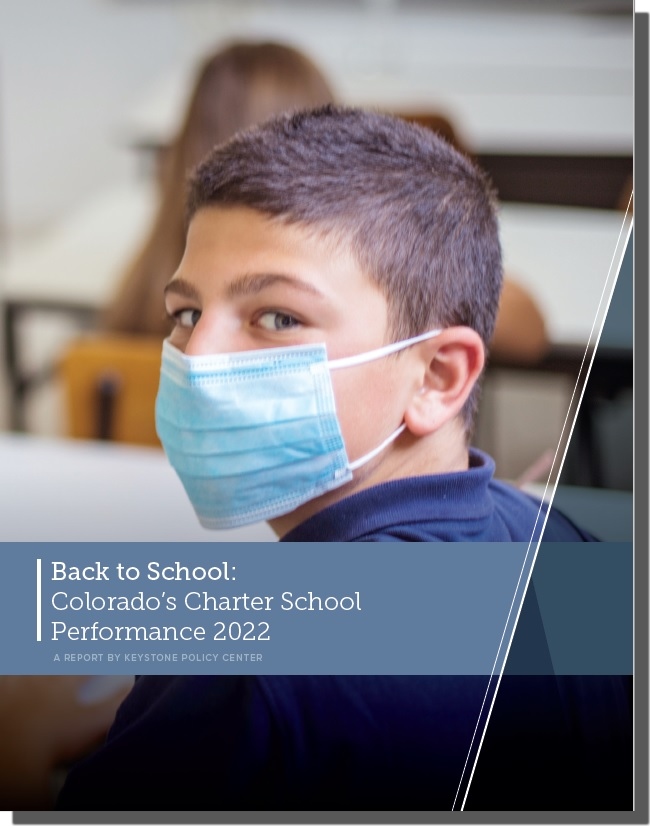Back to School: Colorado’s Academic Performance 2022
While schools largely returned to in-person learning according to the recommended health safety measures and other COVID-era precautions in the 2021-22 school year, data nationwide demonstrates that our students need more support than ever. This report details the first robust data set available in three years and the student achievement scores should be of great concern to parents, community and policy makers.
The National Assessment of Educational Progress (NAEP), the nationally-comparable standard for measuring student achievement, suggests that 9-year-old students are academically performing at levels lower than anytime over the last 20 years. Since early 2020 the average reading score fell by five points, the largest drop since 1990, and math scores dropped seven points, the first decline of any kind in the history of the test. The pandemic had a significant impact on student learning but it was uneven as students from different demographics and settings—urban, suburban and rural—were impacted differently from each other.
Results in Colorado on 2022 academic assessments generally mirrored these nationwide trends, though some schools and districts have bucked this trend, and academic performance bounced back to near pre-pandemic performance for some cohorts of students across the state.
Back to School: Colorado’s Academic Performance 2022 provides a deeper look into student academic performance in response to several key questions while providing some considerations for community and policy makers. Those key questions include:
- What can state academic assessments from spring 2022 tell us?
- How did Colorado students do on the academic assessments? How did this performance compare to prior years?
- How variable was student performance across the state?
- What variation in performance do we see across different student groups?
- What type of variation exists in performance at the school level? What about variation at the school level?
Back to School: Colorado’s Charter School Academic Performance 2022
The Keystone Policy Center also examined data and analyzed how students in charter schools performed compared to students in district-managed schools across Colorado as the state emerged from pandemic shutdowns and interruptions to in-person learning. There are currently 265 charter schools serving about 134,000 students in Colorado (15% of Colorado’s K-12 public school student population), making it a non-trivial proportion of students that is important to learn from.
Keystone Policy Center examined the data and analyzed how students in charter schools performed compared to students in district-managed schools across Colorado Among the key findings included in the report are:
- Charter schools outperformed district-managed schools on the state School Performance Framework.
- The gap was wider when looking only at schools serving large numbers of students from low-income families.
- Charter school students in grades 3-8 outperformed their peers in district-managed schools on both literacy and math tests.
- Critically, fewer than half of all students, regardless of school governance type, are meeting grade level expectations in either subject.
- It is also important to note that in charters and district-managed schools alike, troubling academic gaps persist between lower- and higher-income students.
- Charter schools serving grades 3-8 also showed more academic growth than their district-managed counterparts.
- Charter high schools performed less well, according to SAT data, running even with or lagging behind district-run schools on status measures in both ELA and math.
- On growth measures, charter schools significantly out-performed high-schoolers in district-managed schools
While this report looks at statewide trends, there is wide variation in charter performance across the state, as well as in the demographics of students served. For example, less than 40% of charter high school students in Aurora are at or above benchmarks in literacy compared to over 80% in Jefferson County. In order to understand the lessons to take away from charter performance this must be further explored.
Colorado Academic Performance PInteractive Maps
Keystone has also published a set of interactive maps to accompany the report, which allow a user to explore student enrollment, participation rate, and whether they met or exceeded expectations by region or even by individual school district across the state. Click the images below to access the interactive maps.
PK-12 Student Enrollment

Percentage of Students Who Meet/Exceed Expectations

Statewide Student Participation Rate





 Effective March 1, 2025, Thomas J. Vilsack, former United States Secretary of Agriculture and Governor of Iowa, became the first Chief Executive Officer for the World Food Prize Foundation. In this new role, Governor Vilsack is focusing on expanding the Foundation’s global network, and will further position the Foundation as a leader in addressing global food and nutrition insecurity, continuing his lifetime of public service.
Effective March 1, 2025, Thomas J. Vilsack, former United States Secretary of Agriculture and Governor of Iowa, became the first Chief Executive Officer for the World Food Prize Foundation. In this new role, Governor Vilsack is focusing on expanding the Foundation’s global network, and will further position the Foundation as a leader in addressing global food and nutrition insecurity, continuing his lifetime of public service. Shelby Coffey III is a distinguished journalist, media executive, and thought leader whose career has helped shape the landscape of American news and public discourse. Over several decades, Coffey has held some of the most influential roles in journalism, including serving as editor of the Los Angeles Times, executive vice president of ABC News, and deputy managing editor of The Washington Post. His editorial leadership extended to key roles as president of CNN Financial News, editor of the Dallas Times Herald, and U.S. News & World Report.
Shelby Coffey III is a distinguished journalist, media executive, and thought leader whose career has helped shape the landscape of American news and public discourse. Over several decades, Coffey has held some of the most influential roles in journalism, including serving as editor of the Los Angeles Times, executive vice president of ABC News, and deputy managing editor of The Washington Post. His editorial leadership extended to key roles as president of CNN Financial News, editor of the Dallas Times Herald, and U.S. News & World Report. Jerry Steiner has spent 40 years involved in agriculture following growing up on a Wisconsin dairy farm. He began his career with Monsanto, in multiple business leadership roles. From 2003-2013 he served as a member of the Executive team, as the company’s Executive Vice President of Sustainability and Corporate Affairs. He led the company’s global Government, Public and Industry Affairs teams across the 70 countries where Monsanto conducts business. This experience got Jerry connected to the Keystones centers work in agriculture. Key among his responsibilities were shaping the company’s public policy and building partnerships aimed at helping farmers around the world produce more food, while conserving valuable resources like water and energy. Two unique partnership that developed under his leadership were drought tolerant corn with 5 African countries, CIMMYT and the Gates foundation, and a building a sustainable business model in Brazil with the value chain leading to significant multi-company investment and soybean varieties that can protected themselves.
Jerry Steiner has spent 40 years involved in agriculture following growing up on a Wisconsin dairy farm. He began his career with Monsanto, in multiple business leadership roles. From 2003-2013 he served as a member of the Executive team, as the company’s Executive Vice President of Sustainability and Corporate Affairs. He led the company’s global Government, Public and Industry Affairs teams across the 70 countries where Monsanto conducts business. This experience got Jerry connected to the Keystones centers work in agriculture. Key among his responsibilities were shaping the company’s public policy and building partnerships aimed at helping farmers around the world produce more food, while conserving valuable resources like water and energy. Two unique partnership that developed under his leadership were drought tolerant corn with 5 African countries, CIMMYT and the Gates foundation, and a building a sustainable business model in Brazil with the value chain leading to significant multi-company investment and soybean varieties that can protected themselves. Jennifer Morris is the Chief Executive Officer of The Nature Conservancy, leading a team of nearly 6,000 staff working in more than 80 countries and territories tackling the dual crises of the
Jennifer Morris is the Chief Executive Officer of The Nature Conservancy, leading a team of nearly 6,000 staff working in more than 80 countries and territories tackling the dual crises of the  Congressman Joe Neguse represents Colorado’s 2nd District in the U.S. House of Representatives. He was elected to his first term in November 2018, becoming the first Black Member of Congress in Colorado history. In December 2022, Rep. Neguse was elected by his colleagues to serve as Chair of the Democratic Policy and Communications Committee (DPCC), becoming the first Coloradan to serve in a senior elected leadership role in the House in over 85 years. He serves on the Natural Resources and Judiciary Committees, and was also appointed by House Minority Leader Hakeem Jeffries to serve as one of four Democrats on the prestigious Rules Committee. Rep. Neguse serves as Ranking Member on the House Subcommittee on Federal Lands, which he previously Chaired in the 117th Congress.
Congressman Joe Neguse represents Colorado’s 2nd District in the U.S. House of Representatives. He was elected to his first term in November 2018, becoming the first Black Member of Congress in Colorado history. In December 2022, Rep. Neguse was elected by his colleagues to serve as Chair of the Democratic Policy and Communications Committee (DPCC), becoming the first Coloradan to serve in a senior elected leadership role in the House in over 85 years. He serves on the Natural Resources and Judiciary Committees, and was also appointed by House Minority Leader Hakeem Jeffries to serve as one of four Democrats on the prestigious Rules Committee. Rep. Neguse serves as Ranking Member on the House Subcommittee on Federal Lands, which he previously Chaired in the 117th Congress. Llewellyn King was born in Southern Rhodesia, now Zimbabwe. He went into journalism as soon as he turned 16, stringing for Time magazine and United Press in Africa.
Llewellyn King was born in Southern Rhodesia, now Zimbabwe. He went into journalism as soon as he turned 16, stringing for Time magazine and United Press in Africa. Steven Williams is the Chief Executive Officer of PepsiCo North America, overseeing a more than $48 billion business that spans PepsiCo’s Foods and Beverage operating units. His leadership encompasses more than 125,000 associates and over 900 locations across the U.S. and Canada. Steven joined PepsiCo in 2001 as part of PepsiCo’s acquisition of the Quaker Oats Company, which he joined in 1997, and has held leadership positions of increased responsibility since.
Steven Williams is the Chief Executive Officer of PepsiCo North America, overseeing a more than $48 billion business that spans PepsiCo’s Foods and Beverage operating units. His leadership encompasses more than 125,000 associates and over 900 locations across the U.S. and Canada. Steven joined PepsiCo in 2001 as part of PepsiCo’s acquisition of the Quaker Oats Company, which he joined in 1997, and has held leadership positions of increased responsibility since.